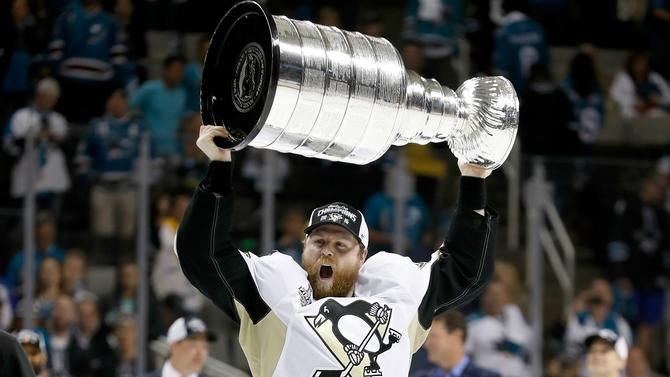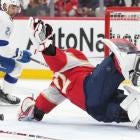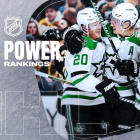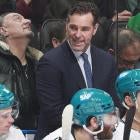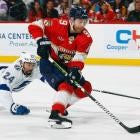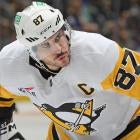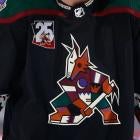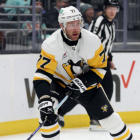In the coming days and weeks, you may hear about how Phil Kessel was "new and improved," that he "finally figured it out" or that he finally was able to deliver something he could not elsewhere. Yet the only difference between the Phil Kessel of today and the Phil Kessel of yesteryear is that his name will be engraved on the Stanley Cup.
The player who put up a team-best 22 points over 24 playoff games en route to his first and the Pittsburgh Penguins' fourth Stanley Cup did not look all that different on the ice than the guy who had four 30-plus goal seasons and two seasons with 80 points or more with the Toronto Maple Leafs. He has the same electrifying speed, the same whip-quick release and, yes, even the same uneasiness in postgame media scrums with his typical "aw shucks" approach.
Kessel did not change. The scenery and situation did. Yet, with all of the star power in Pittsburgh, far more than he had surrounding him in previous stops, Kessel still found a way to rise to the top, especially when it mattered most.
Despite consecutive regular seasons in which his production waned from past highs, he had his best in the playoffs, propelling an offense that averaged more than three goals per game. That apparently was not enough to earn him the Conn Smythe as playoff MVP this year, but it should be enough to quiet Kessel's many, many critics.
When you look at the way the Penguins played this postseason, they leaned heavily on some of the things that have made Kessel successful in his career. The speed game that had become a hallmark of the Penguins' postseason success was something long-established in Kessel's repertoire. With 98 shots on goal, Kessel was a big part of their relentless attack and willingness to put pressure on the opposing goalie with a high volume of shots.
Then you look at the line that carried the team for much of the postseason. Along with Nick Bonino and Carl Hagelin, Kessel helped make the HBK Line an unstoppable force. That trio combined for a staggering 56 points and gave every single opponent all they could handle with their incredible attacking ability.
Playing with Bonino and Hagelin allowed Kessel to unlock the very best parts of his game and deploy them in a particularly effective manner. And while he appeared more defensively responsible than in years past, the biggest difference is not so much what he was doing specifically as it was having a team that was as good as any at exiting their zone. Their ability to transition was more effective because of forwards like Kessel being able to get up and down the ice.
To say that Kessel had a better supporting cast, or if we're being even more accurate that he was part of a supporting cast to bigger stars, doesn't diminish his contributions to the team. It just shows how important good team building is to winning a title. By all accounts, GM Jim Ruterford put the right pieces in place by overhauling his roster. The first major acquisition of that overhaul was Kessel. He was a major building block to this title.
That change in scenery couldn't have been more welcome for Kessel, either. In his two previous stops, it almost seemed like the chips were stacked against him before he even arrived.
Kessel no longer had the crushing weight of being a top-five pick, as he did with the Boston Bruins, a team that seems to chew through most of its best young players long before they even hit their peak. He didn't have the immediate pressure of a team mortgaging their future to acquire him, like the Maple Leafs did. Their sending two first-round draft picks to the Bruins that would become Tyler Seguin and Dougie Hamilton - both of them are now on different teams, too - put the weight of expectations on Kessel. From a pure production standpoint, he lived up to those expectations. However, as the team failed, he got the blame. He was THE guy on a team that didn't have many other guys around him. Then you add in a big contract extension and that only intensifies the scrutiny.
Kessel did not ask to be a star player. It wasn't in his personality. It's not that he didn't play like a star, because his production over the years says he did. It's that he didn't want to be a star and deal with all of the other obligations that go along with it. That seemed to rub people the wrong way, even though it was clear that it wasn't in Kessel's personality to be that guy.
Because of that, so often he was viewed as the problem as opposed to literally everything else. He didn't do enough. He fell short of expectations.
When Team USA sat down to put together a roster for the upcoming World Cup of Hockey, Kessel was left completely off of it, despite previous Olympic experience and success on the international stage. Now he's a Stanley Cup champion and the leading scorer for the team that won and he's not going to be there? It was silly then and it's even more ridiculous in retrospect that he's not going to that tournament.
When you look at the way Rutherford built this team, look at the players he acquired. Many of them were players who had never won before, who had with one team or another appeared to be an ill fit. They all turned out to fit perfectly in Pittsburgh, though. That's the exact description of all three guys on the HBK Line.
In Kessel's case, his character has continually been under attack, but everyone from Rutherford to head coach Mike Sullivan to many of the Penguins players, he was given glowing reviews. All you needed to see was how happy his teammates were when Kessel finally got his turn with the Cup and gave it a good skate. They were jumping up and down and clapping. It wasn't just because they were all happy. They were even happier for him, knowing what he's had to deal with over his career. Most of them will never face scrutiny like that.
You also see the moment Kessel shares with his younger sister and Olympic hockey player, Amanda. The families know better than anyone how much work went into getting to a moment like that. They've also probably seen their fare share of the criticism and sometimes it cuts them more than it does the player. The tears of joy were flowing.
Amanda Kessel extremely proud of her brother pic.twitter.com/HJ202VeWRT
— From The Faceoff (@FromTheFaceoff) June 13, 2016
Everything that Kessel has gone through in his career -- and let's recall that this is a guy who had to battle and beat cancer in his early NHL days -- every critic, which has occasionally included ex-teammates and coaches, and every stumble along the way shrinks into the background.
No, Phil Kessel didn't change. How he'll be referred to from now on did, though. No matter where he goes, no matter what he does next, Phil Kessel is forever a Stanley Cup champion.
